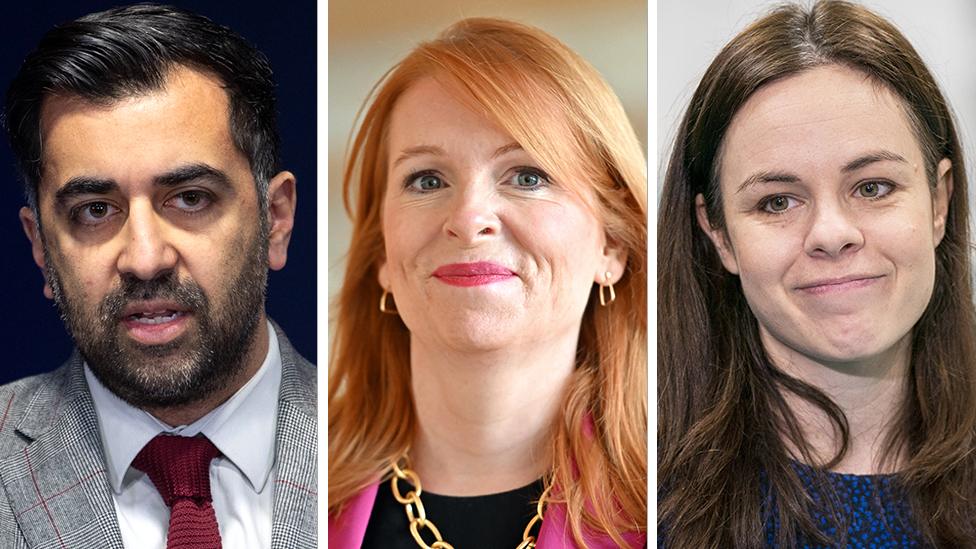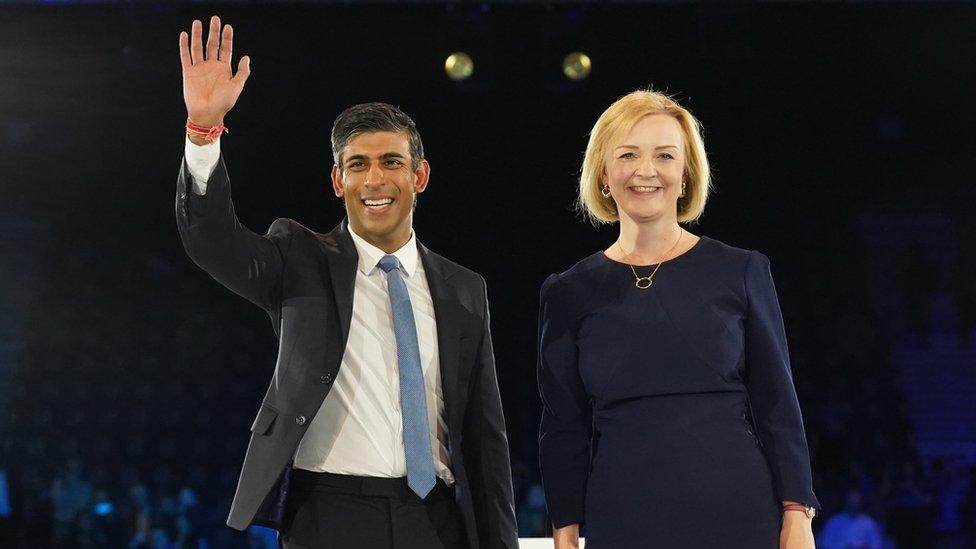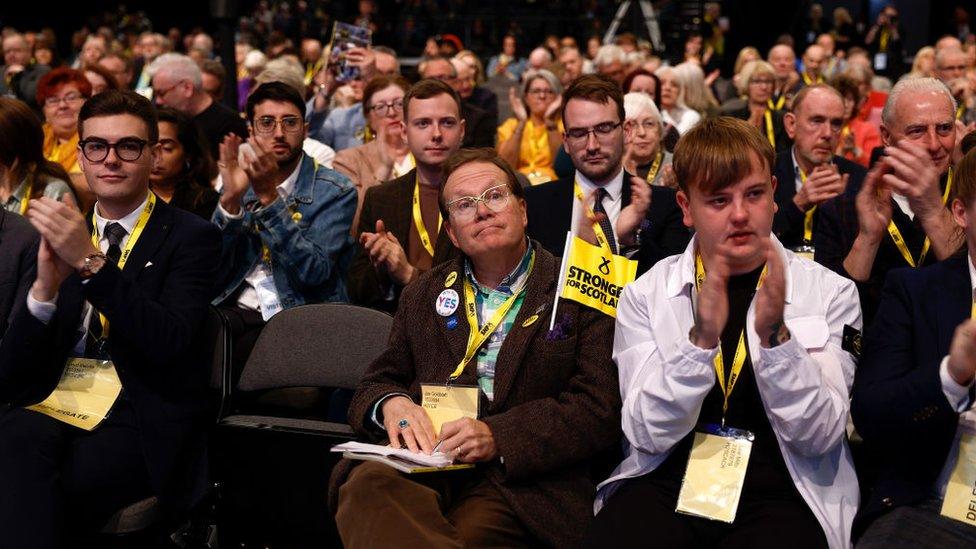SNP accused of infringing press freedoms over hustings access
- Published

Three contenders - Humza Yousaf, Ash Regan and Kate Forbes - have all said journalists should be able to cover the hustings
The SNP is infringing press freedoms by limiting media access to its leadership hustings, a journalist has claimed.
Daily Record political editor Paul Hutcheon said the contest would decide the next first minister.
And he said preventing journalists from attending was a "terrible look" that would make the SNP "less transparent than the Tories".
The SNP said on Tuesday journalists would not be allowed into the events to create a "safe space" for members.
Party bosses have since done a partial u-turn after the BBC, STV, ITN and Sky joined together to challenge the ban on journalists.
STV will now be allowed to send one camera to record the first hustings at Cumbernauld Theatre on Wednesday evening, with a single print journalist and one radio journalist also able to attend.
They would be there on what is known as a pooled basis - meaning they will effectively be covering the event on behalf of the entire media.
The SNP has also said that the hustings will now be streamed live on its social media channels, which it had not originally planned to do.
Nine hustings are planned over the coming weeks for party members to hear from the three candidates and ask them questions.
They are being held in relatively small venues, with only a tiny fraction of the SNP's membership able to attend.
The candidates in the contest - Ash Regan, Humza Yousaf and Kate Forbes - have all said they believe the media should be able to fully report on the events.
It has been announced that they will face questions from host Stephen Jardine and a studio audience in a prime-time edition of Debate Night on BBC One Scotland at 20:00 on Tuesday 14 March.The Debate Night Leadership Special from Edinburgh will also be streamed live on BBC News online and on the iPlayer and there will be comprehensive previews and post-debate coverage on BBC news outlets.

The media was allowed full access to Conservative leadership hustings, including this one at Wembley Arena
Mr Hutcheon told BBC Radio's Good Morning Scotland that the current arrangements for the party hustings were "deeply unsatisfactory", adding: "It looks like press freedoms are being infringed.
"This is not simply a contest to select the SNP leader. This person will lead the country and become first minister of the country.
"It affects everyone, not simply SNP members. Everyone in Scotland is entitled to see these three candidates up close and personal."
He called for at least one journalist from every media outlet to be able to attend in person.
The Conservative Party allowed full media access to hustings during its leadership contest last year.
Mr Hutcheon asked: "Are the SNP really going to be less transparent then the Tories? It is a terrible look and it is a shambles of the SNP's own making.
"I think they have an allergy to transparency. If you look at SNP headquarters there are questions about donations, about loans and I think their instincts are not to allow media into these things.
"They have to realise what the optics are of this situation and make a U-turn very quickly."
The Society of Editors said banning journalists from the events would be "outrageous", with its executive director Dawn Alford saying there was a "clear and unequivocal public interest" in the media being able to "provide proper scrutiny of the candidates for the benefit of the public".

Only a tiny percentage of SNP members would have been able to watch the hustings under the party's original plan
The three candidates standing to replace Nicola Sturgeon have also backed calls for journalists to be allowed to report on the hustings.
Ms Regan said they had "a duty to be held to scrutiny". Ms Forbes said the events should be streamed live and a spokesman for Mr Yousaf said he had "no problem with the media seeing any of the hustings".
However, during BBC Radio Scotland's Morning Call programme, SNP MSP Siobhian Brown said she could understand why some members did not want the media to attend.
In a text read out by presenter Kaye Adams, the politician wrote: "Some SNP members are private about their politics, especially business owners and people in jobs where they cannot be political who feel if their politics was made public it could be detrimental to their business or jobs."
The programme also heard from party member Sarah from Renfrewshire. She said she would not attend an open hustings arguing that there should be two approaches - events with the media and open to the public and others just for SNP members.
She added: "I want to question in private. I am a member of a party, it really is important to me, but my job is quite significant and my political views are personal."
'Safe space'
A spokesman for the SNP said: "We are in discussion with media outlets making a request for access to our members' hustings event in Cumbernauld, and we're already looking at ways to make content available to our wider membership for the remainder of this series of events."
The party had initially argued that: "It is the members who will be voting for the next leader of the party, so the SNP NEC has designed the party hustings as a safe space for members to ask questions of the three candidates."
Scottish Conservative chairman Craig Hoy said preventing the media from attending the husting was "cowardly and paranoid". Labour MP Ian Murray said it was "vital that proper scrutiny takes place in a transparent contest".
The ballot of SNP members, which will use a single transferrable vote system, opens on 13 March and the winner of the leadership contest will be announced on 27 March.


The SNP's initial concern was to make the hustings events a "safe space" for members.
Concern for the membership is all well and good, but the point is that these events should not become a safe space for the candidates.
This is a race to choose the next first minister, so there is legitimate public interest in hearing how the contenders pitch themselves to their party.
And intensive scrutiny is really no bad thing here. Leadership contests are tough for a good reason.
If one of the candidates to be the next first minister is harbouring some weakness that could crack under pressure, do you want to find out about it now, or in the first week of the next pandemic?
Politically, the idea of closing the doors also presented an open goal to the SNP's opponents. Labour complained they were stitching up the selection of the next first minister in secret.
And the Conservatives - never a party the SNP wants to cede the moral high ground to - conducted the bulk of their recent leadership contests in full public view.
So the u-turn on this was pretty predictable - and for all that it may be quickly forgotten as the contest moves on, this was a distinctly avoidable row.